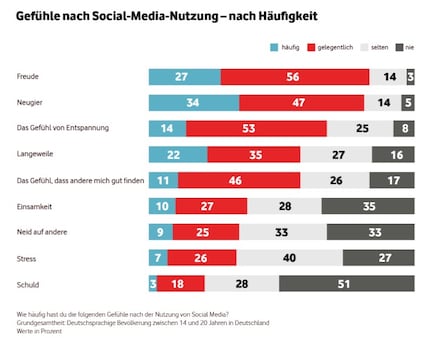
Background information
The new school year’s knocking our old routines out of whack
by Michael Restin

The Vodafone Foundation surveyed over 1,000 young people aged between 14 and 20 about their use of social media. In addition to mixed feelings, they expressed a desire for the topic to become more important in the classroom.
For the study «Between screen time and self-regulation», over 1,000 young people in Germany aged between 14 and 20 gave an insight into their habits and feelings when using social media. And they were quite reflective: Almost three quarters of those surveyed said they spend more time on social media than they would like. A third do so frequently, and a further 41 per cent do so at least occasionally. A good half of young people would like to reduce their use of social media, but are unable to do so.
A full 70 per cent of girls are of the opinion that they neglect other things due to their social media use. The boys have a more balanced view, «only» for 53 per cent, the rest of life has to take a back seat to social media. In addition, the downsides of exclusion, devaluation and incriminating content are much more of a problem for girls.
In general, young people associate more positive than negative emotions with using the internet: it brings joy, satisfies curiosity and provides relaxation for the majority. In addition to entertainment, dialogue and inspiration, it is also simply about staying up to date. Half say: «I don't want to miss anything!» Just under a third feel under pressure to keep up and post themselves.

According to the study, many people are under considerable strain. Loneliness, envy and stress are among the negative feelings experienced by a good third of respondents. A fifth of respondents even feel guilty as soon as they close the social app again. More than half of people of the same age who do without social media find «cool». When they meet in real life, respondents believe they can recognise whether the person is active on social media or not by the language used by the other person.
Almost three quarters find useful learning content via social media, but almost as many are distracted from learning by the constant temptation to follow the algorithm's suggestions. As many as 60 per cent claim to be less active on social media before exams and to be able to reconcile its use with their learning goals.
Perhaps also because this generation is used to doing homework with background music: Over half admit to at least occasionally having a video playing in the background that has nothing to do with the actual topic.
Almost all schools have clear rules on mobile phone use and the majority of respondents are in favour of a ban on smartphones in lessons or classrooms. When it comes to dealing with social media, over 80 per cent want appropriate teaching units, school projects and concrete tips on the healthy use of TikTok, Instagram & Co.
Almost everyone would be open to courses that can help improve concentration and working behaviour in everyday school life. If the programmes are not part of regular lessons, enthusiasm drops. Although 88 per cent are in favour of a social media consultation hour, only 15 per cent of respondents would actually make use of it. Most responded with: «Sounds good, but I'm not sure if I would go.» Or: «I don't need it.»
School programmes are important, but they can't make up for everything that is missed at home. According to the KIM study, apps such as TikTok and WhatsApp are often permitted well before the official minimum age and are not restricted in more than half of families. On average, children hold their first smartphone in their hands at the age of 11.
Of the 14 to 20-year-olds surveyed by the Vodafone Foundation, 53 per cent stated that there are no rules on the use of social media at home - although this could also be due to the fact that some of them are young adults. Parents predominantly rely on conversations about the topic. As many as 47 per cent of young people still believe that their parents know what content they see on social media. In the case of girls, they seem to take a closer look: Here, 52 per cent of daughters think their parents know, while only 42 per cent of sons believe this.
A full 69 per cent of young people spend more than two hours a day on social media apps, with 27 per cent still breaking the five-hour brand. Higher education leads to slightly more self-control, with 12 per cent fewer of this group being marathon swipers and scrollers
In addition to this high usage time, the study at least also shows that most people are aware of the problem and would like to find a healthy way of using smartphones and social media. Parents and schools need to help with this - after all, the platforms are doing everything they can to make it as difficult as possible for them.
Simple writer and dad of two who likes to be on the move, wading through everyday family life. Juggling several balls, I'll occasionally drop one. It could be a ball, or a remark. Or both.
From the latest iPhone to the return of 80s fashion. The editorial team will help you make sense of it all.
Show all